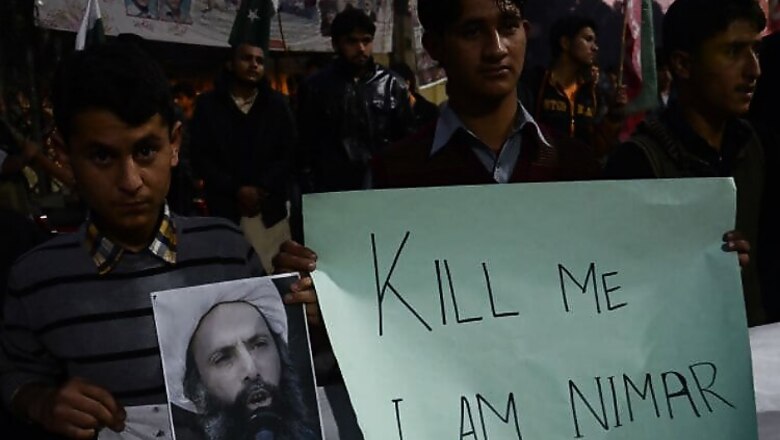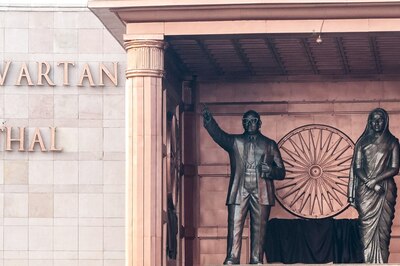
views
Riyadh: Saudi Arabia on Saturday executed a prominent Shiite cleric behind anti-government protests along with 46 other men, drawing angry condemnation from Iran and Iraq.
The execution of Nimr al-Nimr and the others, including Shiite activists and Sunnis accused of involvement in deadly Al-Qaeda attacks, was announced by the Saudi interior ministry.
It prompted calls for demonstrations, with the brother of the 56-year-old cleric warning it could stir more trouble in oil-rich Eastern Province where Shiites complain of marginalisation.
"This action will spark anger of (Shiite) youths" in Saudi Arabia, said Mohammed al-Nimr.
The interior ministry said the 47 men had been convicted of adopting the radical "takfiri" ideology, joining "terrorist organisations" and implementing various "criminal plots".
A list published by the official Saudi Press Agency included Sunni Muslims convicted of involvement in Al-Qaeda attacks that killed Saudi and foreigners in the kingdom in 2003 and 2004.
One of those executed was Fares al-Shuwail, described by Saudi media as Al-Qaeda's top religious leader in the kingdom. He was arrested in 2004.
Notably absent from the list, however, was Nimr's nephew, Ali al-Nimr, whose arrest at the age of 17 and alleged torture during detention sparked condemnation from rights watchdogs and the United States.
All those executed were Saudis, except for an Egyptian and a Chadian.
Some were beheaded with a sword while others were executed by firing squad, said interior ministry spokesman Mansur al-Turki.
Executions have soared in the country since King Salman acceded the throne in January 2015, with 153 people, including convicted drug-traffickers, put to death last year, nearly twice as many as in 2014.
Yesterday's executions drew condemnation from Shiite-majority Iran and Iraq, and calls for anti-Saudi protests.
"The Saudi government supports terrorist movements and extremists, but confronts domestic critics with oppression and execution," said Hossein Jaber Ansari, spokesman for Iran's foreign ministry.
"The Saudi government will pay a high price for following these policies," the official IRNA news agency quoted him as saying.
He said Nimr's execution "merely shows the extent of irresponsibility and impudence".
In Riyadh, Turki described Iran's reaction as "irresponsible". "We are completely confident with what we're doing and we believe in it and do not care how others view our procedures, whether on justice or implementation of sentences," he told a news conference.
Meanwhile, on Sunday angry crowds protesting at Saudi Arabia's execution of a top Shiite cleric set fire to the kingdom's embassy in Tehran and stormed the building before being cleared out by police, reports said.
In Mashhad, Iran's second biggest city, demonstrators yesterday meanwhile set fire to the Saudi consulate, according to ISNA news agency, carrying pictures of the alleged assault.
The incidents came hours after the announcement of the death of cleric Nimr al-Nimr, a key figure in anti-government protests in the kingdom since 2011.
The execution prompted strong condemnation from Shiite-majority Iran and Iraq.
"There are flames inside the embassy... demonstrators were able to get inside but have since been cleared out," the news agency said.
Protesters had been able to climb up onto the roof of the embassy before they were made to leave, it added.
Websites carried pictures of demonstrators apparently clutching the Saudi flag, which had been pulled down.
Iranian media quoted foreign ministry spokesman Hossein Jaber Ansari as asking police to "protect Saudi Arabia's diplomatic missions in Tehran and Mashhad.
Nimr, who spent more than a decade studying theology in Iran, was among a group of 47 Shiites and Sunnis executed yesterday on charges of terrorism.
The Saudi interior ministry said the men had been convicted of adopting the radical "takfiri" ideology, joining "terrorist organisations" and implementing various "criminal plots".
An official list published included Sunnis convicted of involvement in Al-Qaeda attacks that killed Saudis and foreigners in 2003 and 2004.



















Comments
0 comment